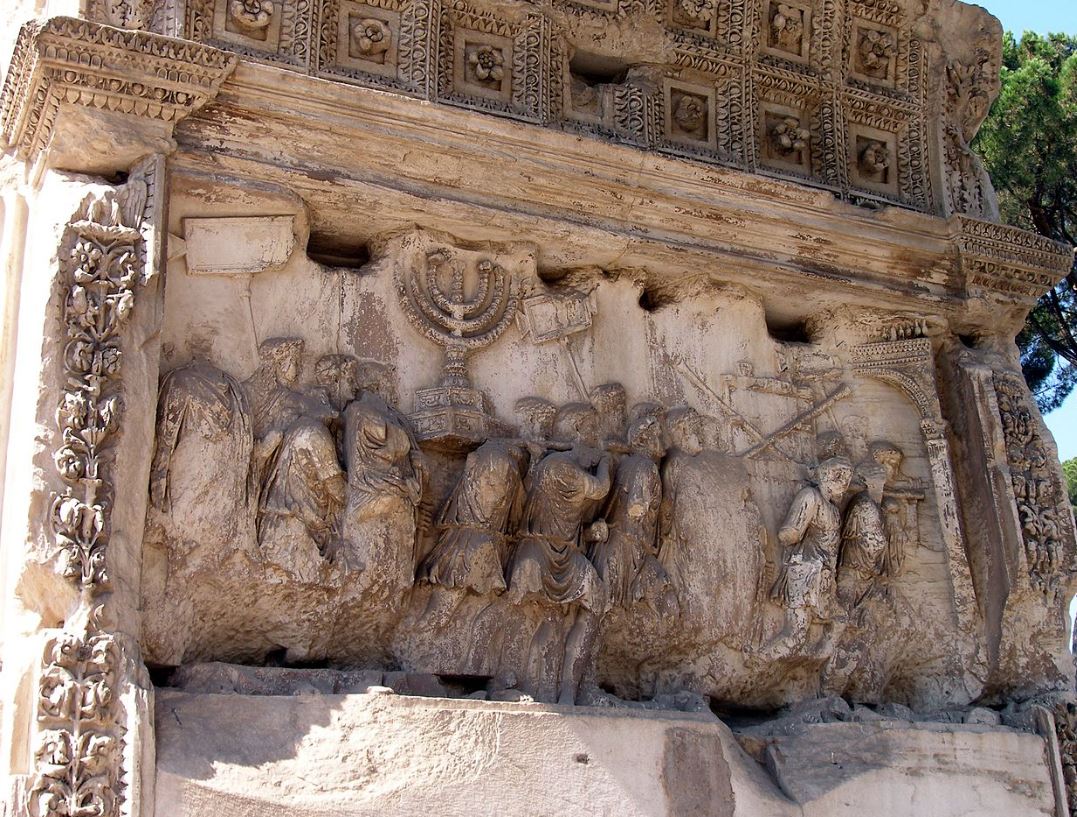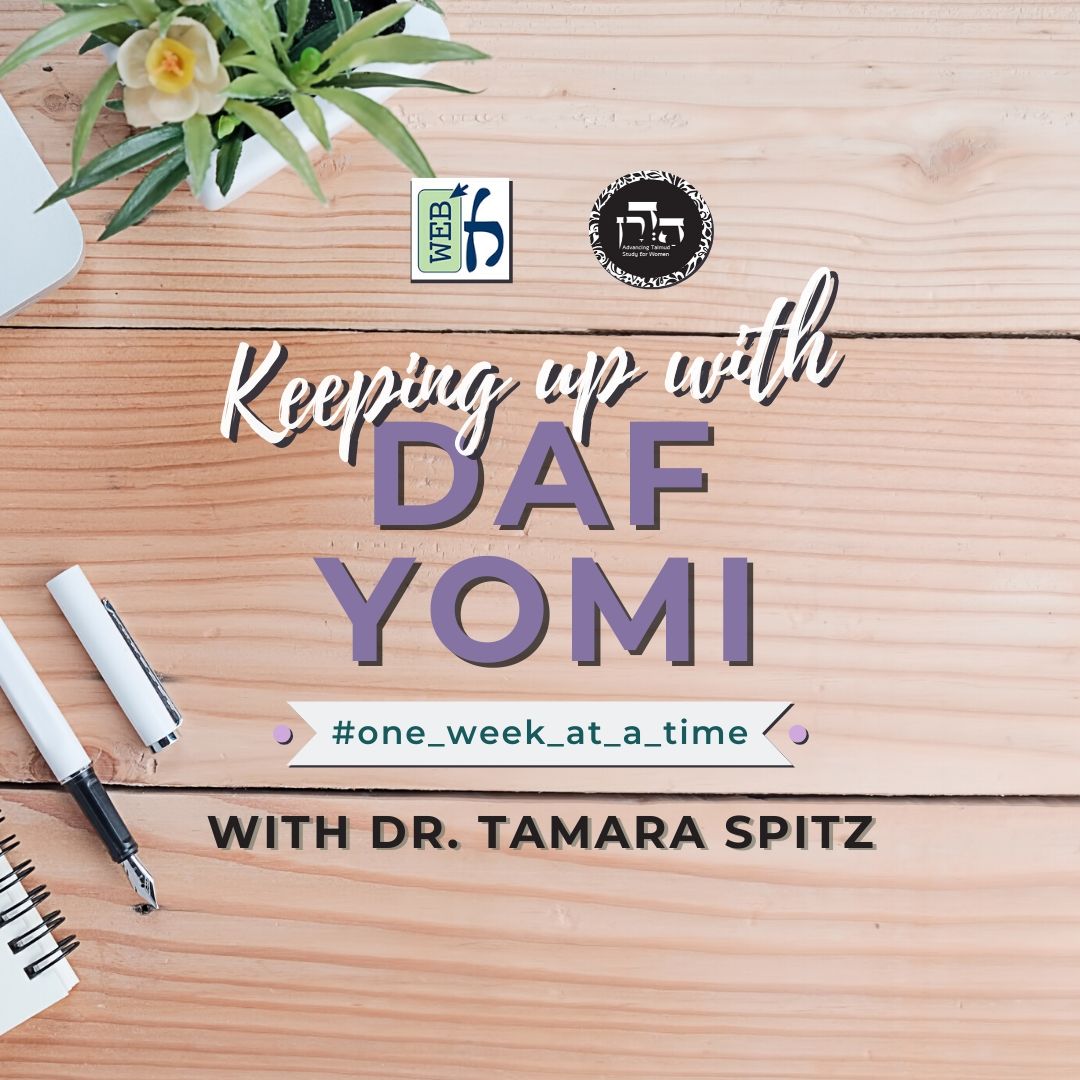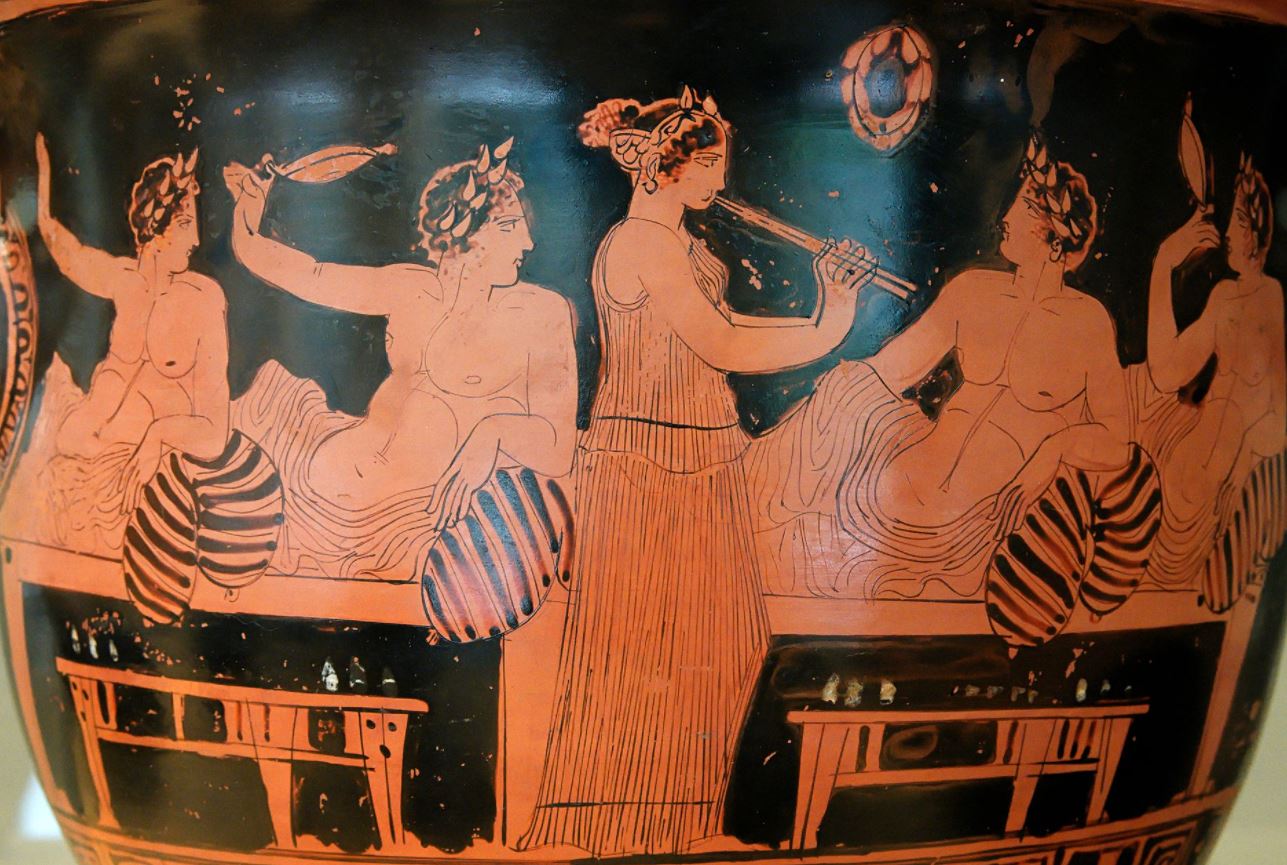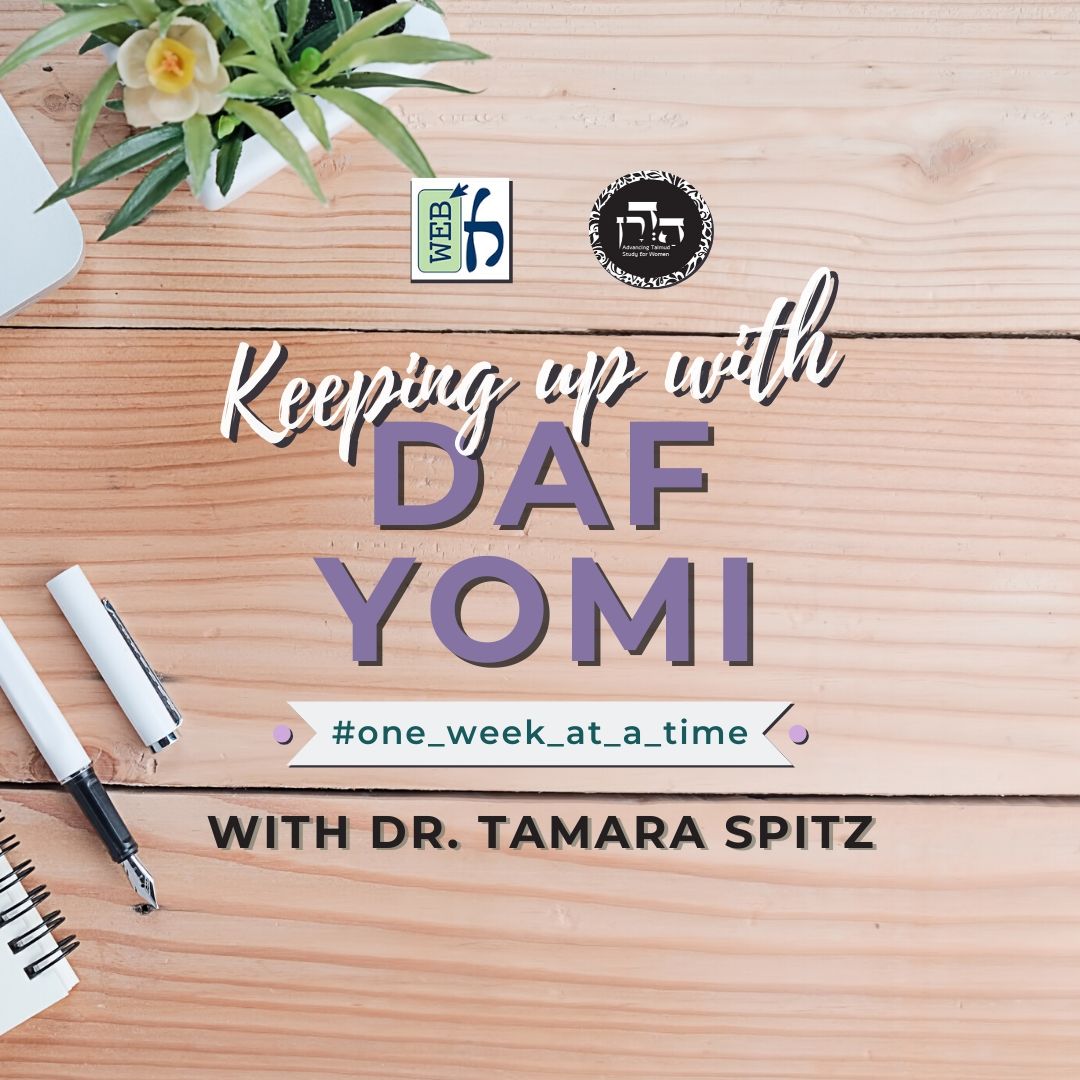What do we derive from the repetition of “the firstborn donkey should be redeemed with a lamb?” A cow that gives birth to a donkey but the donkey slightly resembles the cow is it obligated in firstborn? From where do we derive that regarding kashrut, it goes by the mother in a case where the offspring is different than the mother? From where to we derive that milk of a non kosher animal is forbidden to eat and that milk from a kosher animal is permitted to eat?
This month’s learning is dedicated to the refuah shleima of our dear friend, Phyllis Hecht, גיטל פעשא בת מאשה רחל by all her many friends who love and admire her. Phyllis’ emuna, strength, and positivity are an inspiration.
Want to dedicate learning? Get started here:


Today’s daily daf tools:
This month’s learning is dedicated to the refuah shleima of our dear friend, Phyllis Hecht, גיטל פעשא בת מאשה רחל by all her many friends who love and admire her. Phyllis’ emuna, strength, and positivity are an inspiration.
Today’s daily daf tools:
Delve Deeper
Broaden your understanding of the topics on this daf with classes and podcasts from top women Talmud scholars.
New to Talmud?
Check out our resources designed to help you navigate a page of Talmud – and study at the pace, level and style that fits you.
The Hadran Women’s Tapestry
Meet the diverse women learning Gemara at Hadran and hear their stories.
Bekhorot 6
תַּלְמוּד לוֹמַר: ״פֶּטֶר חֲמוֹר״ ״פֶּטֶר חֲמוֹר״ שְׁנֵי פְּעָמִים — פִּטְרֵי חֲמוֹרִים אָמַרְתִּי לְךָ, וְלֹא פִּטְרֵי סוּסִים וּגְמַלִּים.
Therefore, the verse states the phrase: “Firstborn of a donkey” (Exodus 13:13), “firstborn of a donkey” (Exodus 34:20), mentioning it a total of two times. The additional usage of the term indicates I said to you that firstborn status applies only to firstborns of donkeys, but not to firstborns of horses or camels.
פָּרֵיךְ רַב אַחַאי: אִי כְּתַב רַחֲמָנָא חַד, הֲוָה אָמֵינָא דָּבָר שֶׁהָיָה בַּכְּלָל, וְיָצָא מִן הַכְּלָל לְלַמֵּד, לֹא לְלַמֵּד עַל עַצְמוֹ יָצָא אֶלָּא לְלַמֵּד עַל הַכְּלָל כּוּלּוֹ יָצָא, וּלְעוֹלָם בְּשֶׂה.
Rav Aḥai refutes this claim: How can the extra verse alone indicate that other firstborn non-kosher animals do not have firstborn status? If the Merciful One had written the term “firstborn of a donkey” once, I would say a firstborn donkey is an item that was included in a generalization of all non-kosher animals, but emerged from the generalization to teach that it must be redeemed by means of a lamb. According to the principles of exegesis, it emerged from the generalization to teach not just about itself, but emerged to teach about the entire generalization. And accordingly, all non-kosher animals should actually be redeemed by means of a lamb as well.
כְּתַב רַחֲמָנָא ״פֶּטֶר חֲמוֹר״ אַחֲרִינָא, פִּטְרֵי חֲמוֹרִים וְלֹא פִּטְרֵי סוּסִים וּגְמַלִּים, וְאֵימָא: מַעֲטִינְהוּ מֹשֶׁה, וּלְעוֹלָם בְּכׇל דָּבָר!
Therefore, the Merciful One writes: “Firstborn of a donkey,” another time, to teach that only firstborn donkeys must be redeemed by means of a lamb, but not firstborn horses or camels. And therefore I can say that perhaps the earlier suggestion is correct: The Torah excluded firstborn horses and camels from being redeemed by means of a lamb, but actually, they must still be redeemed by means of any other item.
אִם כֵּן, לִכְתּוֹב רַחֲמָנָא: ״פֶּטֶר חֲמוֹר תִּפְדֶּה בְשֶׂה״ וַ״חֲמוֹר תִּפְדֶּה בְשֶׂה״. ״פֶּטֶר חֲמוֹר תִּפְדֶּה בְשֶׂה״, ״פֶּטֶר חֲמוֹר תִּפְדֶּה בְשֶׂה״ לְמָה לִי? פִּטְרֵי חֲמוֹרִים אָמַרְתִּי לְךָ, וְלֹא פִּטְרֵי סוּסִים וּגְמַלִּים.
The Gemara answers: If it is so that the Torah excludes horses and camels only from redemption by means of a lamb but not from redemption in general, let the Merciful One write: Firstborn of a donkey you shall redeem with a lamb, and: A donkey you shall redeem with a lamb, which would suffice. Why do I need the verse to state: “A firstborn of a donkey you shall redeem with a lamb,” “a firstborn of a donkey you shall redeem with a lamb,” using the same phrase both times? It is necessary to teach that I said to you that firstborn status applies only to firstborns of donkeys, but not to firstborns of horses or camels.
וְתַנָּא דִידַן, לְמַעוֹטֵי סוּסִים וּגְמַלִּים, מְנָא לֵיהּ?
The Gemara asks: And as for the tanna of our mishna, who derived from the repetition of the phrase “firstborn of a donkey” that the mitzva of redeeming a firstborn donkey applies only if the mother and offspring are both donkeys, from where does he derive that the Torah excludes horses and camels from firstborn status?
אָמַר רַב פָּפָּא: כׇּל מִקְנְךָ תִּזָּכָר — כָּלַל, שׁוֹר וָשֶׂה וַחֲמוֹר — פָּרַט, כְּלָל וּפְרָט — אֵין בַּכְּלָל אֶלָּא מַה שֶּׁבַּפְּרָט, שׁוֹר וָשֶׂה וַחֲמוֹר — אִין, מִידֵּי אַחֲרִינָא — לָא.
Rav Pappa said it is derived from the verse: “From all your livestock you shall take the males, the firstborn of the ox and lamb. And the firstborn of a donkey you shall redeem with a lamb” (Exodus 34:19–20). The phrase “From all your livestock you shall take the males” is a generalization, and the reference to an ox and a lamb and a donkey is a detail. According to the principles of exegesis, in the case of a generalization and a detail, the generalization is referring only to that which is specified in the detail.Therefore, an ox and a lamb and a donkey, yes, their offspring have firstborn status, but anything else, no, it does not have firstborn status.
וְרַבִּי יוֹסֵי הַגְּלִילִי? ״פֶּטֶר״ הִפְסִיק הָעִנְיָן, וְרַבָּנַן? וָי״ו הֲדַר עָרְבֵיהּ קְרָא.
The Gemara asks: And as for Rabbi Yosei HaGelili, how does he respond to this claim? The Gemara answers: He holds that a donkey is not included in the generalization “From all your livestock you shall take the males,” as the word “firstborn” in the phrase “and the firstborn of a donkey,” indicates that the Torah interrupts the matter, i.e., the list of details. The Gemara asks: And as for the Rabbis, how do they respond to this claim? The Gemara answers: The letter vav, meaning “and,” in the phrase “and the firstborn of a donkey,” indicates that the verse returns and combines the donkey with the other animals as having firstborn status.
וְרַבִּי יוֹסֵי הַגְּלִילִי? לָא לִכְתּוֹב לָא וָי״ו וְלָא ״פֶּטֶר״.
The Gemara asks: And as for Rabbi Yosei HaGelili, how does he respond? The Gemara answers: He holds that if the donkey was indeed included in the delineation of the other animals that follows the generalization, the Torah would write neither the letter vav nor the word “firstborn,” and it still would be included.
וְרַבָּנַן? אַיְּידֵי דְּהָא קְדוּשַּׁת דָּמִים, וְהָא קְדוּשַּׁת הַגּוּף — פָּסֵיק לְהוּ וַהֲדַר עָרֵיב לְהוּ.
The Gemara asks: And as for the Rabbis, how do they respond to this claim? The Gemara answers: Since this, a firstborn donkey, has sanctity that inheres in its value and must be redeemed by means of a lamb, and that, a firstborn ox and lamb, possess inherent sanctity and are sacrificed upon the altar, the word “firstborn” must interpose between them, and the verse must combine them again with the letter vav for “and,” which indicates that a donkey is also included in the delineation that defines the generalization “From all your livestock you shall take the males.”
אִיבַּעְיָא לְהוּ: פָּרָה שֶׁיָּלְדָה מִין חֲמוֹר, וְיֵשׁ בּוֹ מִקְצָת סִימָנִין — מַהוּ?
§ The Gemara previously cited the mishna (16b) that rules that a ewe that gave birth to a goat of sorts and a goat that gave birth to a ewe of sorts are exempt from the mitzva of the firstborn. And if the offspring has some of the characteristics of its mother, it is subject to the obligations of firstborn status. A dilemma was raised before the Sages about a related matter: In the case of a cow that gave birth to a donkey of sorts, where the mishna (5b) ruled that the offspring does not have firstborn status, and it has some of the characteristics of the mother, what is the halakha?
עֵז שֶׁיָּלְדָה מִין רָחֵל, וְרָחֵל שֶׁיָּלְדָה מִין עֵז, דְּכִי יֵשׁ מִקְצָת סִימָנִין — חַיֶּיבֶת בִּבְכוֹרָה, דְּהָא טְהוֹרָה וְהָא טְהוֹרָה, הָא קְדוּשַּׁת הַגּוּף וְהָא קְדוּשַּׁת הַגּוּף.
The Gemara explains the dilemma: When the mishna states with regard to a goat that gave birth to a ewe of sorts and a ewe that gave birth to a goat of sorts, that when it has some of the characteristics of the mother, it is obligated, i.e., subject to the obligations of firstborn status, perhaps this is because a ewe and a goat are somewhat similar; as this one is a kosher animal and that one is a kosher animal. Likewise, this one has inherent sanctity and may be sacrificed on the altar, and that one has inherent sanctity.
הָכָא, דְּהָא טְמֵאָה וְהָא טְהוֹרָה, הָא קְדוּשַּׁת הַגּוּף וְהָא קְדוּשַּׁת דָּמִים — לָא, אוֹ דִלְמָא: כֵּיוָן דְּאִידֵּי וְאִידֵּי בְּנֵי מִיקְדָּשׁ בִּבְכוֹרָה — קָדוֹשׁ?
But here, in the case of a cow that gave birth to a donkey of sorts, perhaps the halakha would be different, as this, the offspring, resembles a non-kosher animal, and that, the mother, is a kosher animal. Likewise, the firstborns of this species, the cow, possess inherent sanctity, and the firstborns of that species, the donkey, have sanctity that inheres in its value. Therefore, perhaps the offspring does not have firstborn status, even if it has some of the characteristics of the mother. Or perhaps it can be reasoned that since both this cow and that donkey are sanctified with firstborn status, the offspring is sanctified with firstborn status.
וְאִם תִּמְצֵי לוֹמַר: כֵּיוָן דְּאִידֵּי וְאִידֵּי מִיקְדָּשׁ בִּבְכוֹרָה קָדוֹשׁ, חֲמוֹר שֶׁיָּלְדָה מִין סוּס מַהוּ? הָכָא וַדַּאי לָא בַּת מִיקְדָּשׁ בִּבְכוֹרָה הוּא, אוֹ דִלְמָא כֵּיוָן דְּמִין טְמֵאָה הוּא קָדוֹשׁ?
And if you say that since both this cow and that donkey are sanctified with firstborn status, the offspring is also sanctified with firstborn status if it has some characteristics of the mother, then what is the halakha in a case of a donkey that gave birth to a horse of sorts? Perhaps here the offspring certainly does not have firstborn status, as a horse is not sanctified with firstborn status. Or perhaps one can reason that since the mother is a member of a non-kosher species, as is the offspring, the offspring should be sanctified with firstborn status, as it has some characteristics of the mother, which is a donkey.
אִם תִּמְצָא לוֹמַר: כֵּיוָן דְּמִין טְמֵאָה הוּא קָדוֹשׁ, פָּרָה שֶׁיָּלְדָה מִין סוּס מַהוּ? הָכָא וַדַּאי הָא טְהוֹרָה וְהָא טְמֵאָה, הָא בַּת מִיקְדָּשׁ בִּבְכוֹרָה וְהָא לָא בַּת מִיקְדָּשׁ בִּבְכוֹרָה, אוֹ דִלְמָא סִימָנִין מִילְּתָא הִיא?
The Gemara raises an additional dilemma about a related case: If you say in the previous case that since it is a non-kosher species it is sanctified, then what is the halakha in the case of a cow that gave birth to a horse of sorts? Here, one can say there certainly is no reason for the offspring to have firstborn status, as this cow is kosher and that horse is non-kosher. And in addition, this cow is sanctified with firstborn status and that horse is not sanctified with firstborn status. Or perhaps one can reason that having some of the characteristics of the mother is a significant matter and the offspring does have firstborn sanctity.
תָּא שְׁמַע: בְּהֵמָה טְהוֹרָה שֶׁיָּלְדָה מִין בְּהֵמָה טְמֵאָה — פְּטוּרָה מִן הַבְּכוֹרָה, אִם יֵשׁ בּוֹ מִקְצָת סִימָנִין — חַיֶּיבֶת בִּבְכוֹרָה. מַאי לָאו אֲפִילּוּ פָּרָה שֶׁיָּלְדָה מִין סוּס? לֹא, פָּרָה שֶׁיָּלְדָה מִין חֲמוֹר.
The Gemara suggests: Come and hear a proof from a baraita: A kosher animal that gave birth to a non-kosher animal of sorts is exempt from its offspring being counted a firstborn. If the offspring has some of the characteristics of the mother it is obligated, i.e., subject to the obligations of firstborn status. What, does this not include even the case of a cow that gave birth to a horse of sorts? No, it is referring to a case such as where a cow that gave birth to a donkey of sorts, where both species are subject to the sanctity of the firstborn.
תָּא שְׁמַע: פָּרָה שֶׁיָּלְדָה מִין חֲמוֹר, וַחֲמוֹר שֶׁיָּלְדָה מִין סוּס — פְּטוּרָה מִן הַבְּכוֹרָה, אִם יֵשׁ בּוֹ מִקְצָת סִימָנִין — חַיֶּיבֶת בִּבְכוֹרָה. מַאי לָאו אַתַּרְוַיְיהוּ? לָא, אַפָּרָה שֶׁיָּלְדָה מִין חֲמוֹר.
The Gemara suggests: Come and hear another proof from a baraita: In the case of a cow that gave birth to a donkey of sorts or a donkey that gave birth to a horse of sorts, each of the mothers is exempt from their offspring being counted a firstborn. If the offspring has some of the characteristics of the mother, it is obligated, i.e., subject to the obligations of firstborn status. What, is the last clause not referring to both cases of the baraita? If so, this resolves two of the dilemmas about offspring that have some characteristics of the mother. The Gemara responds: No, it is referring only to the case of a cow that gave birth to a donkey of sorts, so only that dilemma is resolved.
אֲבָל חֲמוֹר שֶׁיָּלְדָה מִין סוּס, לְמַאי קָתָנֵי לַהּ? לִפְטוּרָא? פְּשִׁיטָא! הַשְׁתָּא, וּמָה פָּרָה שֶׁיָּלְדָה מִין חֲמוֹר, דְּאִידֵּי וְאִידֵּי בְּנֵי מִיקְדָּשׁ בִּבְכוֹרָה נִינְהוּ, אָמְרַתְּ: אִם יֵשׁ בּוֹ מִקְצָת סִימָנִין — אִין, וְאִי לָא — לָא, חֲמוֹר שֶׁיָּלְדָה מִין סוּס מִיבַּעְיָא?
The Gemara asks: But if so, for what purpose does the baraita teach the case of a donkey that gave birth to a horse of sorts? If it is to exempt the offspring from being accounted firstborn status when it does not have some of the characteristics of its mother, that halakha is obvious for the following reason: And now, if in the case of a cow that gave birth to a donkey of sorts, where both this species and that species are sanctified with firstborn status, you said that if the offspring has some of the characteristics of its mother then yes, it has firstborn status, and if it does not have such characteristics, then no, the offspring does not have firstborn status, then in the case of a donkey that gave birth to a horse of sorts, which generally is not sanctified with firstborn status, is it necessary to state that the horse does not have firstborn status unless it has some of the characteristics of its mother?
אִיצְטְרִיךְ, סָלְקָא דַּעְתָּךְ: הָתָם הוּא דְּיֵשׁ לָהּ קַרְנַיִם, וְהָא אֵין לָהּ קַרְנַיִם; הָא פַּרְסוֹתֶיהָ סְדוּקוֹת, וְהָא פַּרְסוֹתֶיהָ קְלוּטוֹת.
The Gemara answers: It was necessary to teach that case in addition to that of a cow that gave birth to a donkey of sorts, as it might enter your mind that there, in the case of the cow that gave birth to a donkey of sorts, the offspring does not have firstborn status because a cow and donkey are entirely different from one another, as a cow has horns, and this animal, a donkey, does not have horns. Moreover, with regard to that animal, a cow, its hooves are split, but with regard to this animal, a donkey, its hooves are closed [kelutot].
אֲבָל הָכָא, דְּאִידֵּי וְאִידֵּי אֵין לָהּ קַרְנַיִם, אִידֵּי וְאִידֵּי פַּרְסוֹתֶיהָ קְלוּטוֹת, אֵימָא חֲמוֹר אָדוֹם בְּעָלְמָא הוּא, קָמַשְׁמַע לַן.
But here, in the case of a donkey that gave birth to a horse of sorts, where a similarity does exist between the mother and its offspring, as this one and that one both do not have horns, and with regard to both this one and that one its hooves are closed, I can say that this offspring is merely a red donkey, i.e., a donkey with the coloring of a horse, and has firstborn status. Therefore, the tanna teaches us that it is a different species from that of the mother, and does not have firstborn status.
וּמָה הֵן בַּאֲכִילָה כּוּ׳. לְמָה לִי לְמִיתְנֵי ״שֶׁהַיּוֹצֵא״?
§ The mishna teaches with regard to an animal whose offspring resembles a different species: And what is the offspring’s halakhic status with regard to its consumption? In the case of a kosher animal that gave birth to a non-kosher animal of sorts, its consumption is permitted. And in the case of a non-kosher animal that gave birth to a kosher animal of sorts, its consumption is prohibited. This is because that which emerges from the non-kosher animal is non-kosher and that which emerges from the kosher animal is kosher. The Gemara asks: Why do I need the mishna to teach the concluding phrase: This is because that which emerges from the non-kosher animal is non-kosher and that which emerges from the kosher animal is kosher?
סִימָנָא בְּעָלְמָא הוּא, דְּלָא תִּיחַלַּף לָךְ, דְּלָא תֵּימָא: זִיל בָּתְרֵיהּ דִּידֵיהּ, וְהַאי טָהוֹר מְעַלְּיָא הוּא, וְהַאי טָמֵא מְעַלְּיָא הוּא, אֶלָּא זִיל בָּתַר אִימֵּיהּ.
The Gemara answers: It is merely a mnemonic to ensure that you do not mistakenly reverse the halakha in these two cases, so that you do not say: Follow its appearance, and therefore this offspring that looks like a kosher animal is a full-fledged kosher animal, despite being born to a non-kosher animal; and that one that looks like a non-kosher animal is a full-fledged non-kosher animal, despite its mother being a kosher animal. Rather, the mishna teaches that one must follow the status of its mother.
מְנָא הָנֵי מִילֵּי? דְּתָנוּ רַבָּנַן: ״אַךְ אֶת זֶה לֹא תֹאכְלוּ מִמַּעֲלֵי הַגֵּרָה וּמִמַּפְרִיסֵי הַפַּרְסָה״ — יֵשׁ לְךָ שֶׁהוּא מַעֲלֵה גֵרָה וּמַפְרִיס פַּרְסָה וְאִי אַתָּה אוֹכְלוֹ, וְאֵיזֶה זֶה? טָהוֹר שֶׁנּוֹלַד מִן הַטָּמֵא. אוֹ אֵינוֹ אֶלָּא טָמֵא הַנּוֹלָד מִן הַטָּהוֹר, וּמַאי ״מִמַּעֲלֵי הַגֵּרָה וּמִמַּפְרִיסֵי הַפַּרְסָה״?
The Gemara asks: From where are these matters derived? The Gemara answers: They are derived from a verse, as the Sages taught that when the verse states: “Nevertheless these shall you not eat, of them that chew the cud, or of them that split the hoof” (Leviticus 11:4), this verse indicates that you have an animal that chews the cud and has split hooves, but nevertheless you may not eat it. And which is this? It is a kosher animal that was born from a non-kosher animal. Or perhaps it excludes only a non-kosher animal that does not chew the cud or have split hooves that was born from a kosher animal, and if so what is the explanation of the verse “of them that chew the cud, or of them that split the hoof”?
הָכִי קָאָמַר: דָּבָר הַבָּא מִמַּעֲלֵי הַגֵּרָה וּמִמַּפְרִיסֵי הַפַּרְסָה לָא תֵּיכוּל, תַּלְמוּד לוֹמַר: ״גָּמָל… טָמֵא הוּא״ — הוּא טָמֵא, וְאֵין טָמֵא הַנּוֹלָד מִן הַטָּהוֹר טָמֵא אֶלָּא טָהוֹר.
This is what it is saying: You shall not eat a being that comes from one of those animals that chew their cud and have split hooves if it itself does not have the signs of being kosher. To counter this, the continuation of the verse states: “The camel…is impure for you” (Leviticus 11:4). This indicates that a camel itself is non-kosher, but a non-kosher animal that is born from a kosher animal is not non-kosher; rather, it is kosher.
רַבִּי שִׁמְעוֹן אוֹמֵר: ״גָּמָל״ ״גָּמָל״ שְׁנֵי פְּעָמִים, אֶחָד גָּמָל הַנּוֹלָד מִן הַגְּמַלָּה, וְאֶחָד גָּמָל הַנּוֹלָד מִן הַפָּרָה.
Rabbi Shimon says it is stated: “Camel” (Leviticus 11:4), “camel” (Deuteronomy 14:7), teaching the term two times with regard to the prohibition of consumption. This teaches that both a camel that is born from a camel and a camel that is born from a cow are non-kosher. According to Rabbi Shimon, a non-kosher animal born to a kosher animal is forbidden for consumption, in contrast to the ruling in the mishna.
וְרַבָּנַן, הַאי ״גָּמָל״ ״גָּמָל״ מַאי עָבְדִי לֵיהּ? חַד לֶאֱסוֹר עַצְמוֹ, וְחַד לֶאֱסוֹר חֲלָבוֹ. וְרַבִּי שִׁמְעוֹן, לֶאֱסוֹר חֲלָבוֹ מְנָא לֵיהּ? נָפְקָא לֵיהּ מֵ״אֶת הַגָּמָל״. וְרַבָּנַן, ״אֶתִּים״ לָא דָּרְשִׁי.
The Gemara asks: And as for the Rabbis in the baraita, who disagree with Rabbi Shimon, what do they do with this repetition of “camel,” “camel”? The Gemara answers that one of the verses is written to prohibit the camel itself and one is written to prohibit the female camel’s milk. The Gemara asks: And as for Rabbi Shimon, from where does he derive that a camel’s milk is forbidden? The Gemara answers: He derives it from the phrase “the camel [et hagamal].” The verse could have stated just the term “hagamal.” The addition of the word “et” teaches that the prohibition applies also to its milk. And the Rabbis do not interpret instances of “et” as a means to derive new halakhot; they consider it to be an ordinary part of the sentence structure and not a source for exegetical exposition.
כִּדְתַנְיָא: שִׁמְעוֹן הָעַמְסוֹנִי הָיָה דּוֹרֵשׁ כׇּל ״אֵת״ וָ״אֵת״ שֶׁבַּתּוֹרָה, כֵּיוָן שֶׁהִגִּיעַ לְ״אֶת ה׳ אֱלֹהֶיךָ תִּירָא״ פֵּירַשׁ. אָמְרוּ לוֹ תַּלְמִידָיו: רַבִּי, כׇּל ״אֶתִּין״ שֶׁדָּרַשְׁתָּ מָה תְּהֵא עֲלֵיהֶם? אָמַר לָהֶם: כְּשֵׁם שֶׁקִּבׇּלְתִּי שָׂכָר עַל הַדְּרִישָׁה, כָּךְ אֲנִי מְקַבֵּל שָׂכָר עַל הַפְּרִישָׁה.
As it is taught in a baraita: Shimon HaAmasoni would interpret each and every occurrence of the word “et” in the Torah, deriving additional halakhot with regard to the particular subject matter. Once he reached the verse: “You shall fear the Lord your God” (Deuteronomy 6:13), which is written with the added word “et,” he withdrew from this method of exposition, as whose fear could be an extension of the fear of God? His students said to him: Our teacher, what will be with all the occurrences of “et” that you interpreted until now? Shimon HaAmasoni said to them: Just as I received reward for the exposition, so I receive reward for my withdrawal from using this method of exposition.
עַד שֶׁבָּא רַבִּי עֲקִיבָא וְלִימֵּד: ״אֶת ה׳ אֱלֹהֶיךָ תִּירָא״ — לְרַבּוֹת תַּלְמִידֵי חֲכָמִים.
The word “et” in this verse was not explained until Rabbi Akiva came and taught: “You shall fear the Lord your God”; the word “et” in the verse serves to include Torah scholars, i.e., that one is commanded to fear them just as one fears God. In any event, Shimon HaAmasoni no longer derived additional halakhot from “et.” The Rabbis follow the conclusion of Shimon HaAmasoni that “et” is not expounded.
אֲמַר לֵיהּ רַב אַחָא בְּרֵיהּ דְּרָבָא לְרַב אָשֵׁי: אֶלָּא מֵעַתָּה, טַעְמָא דְרַבָּנַן מִ״גָּמָל״ ״גָּמָל״, וְרַבִּי שִׁמְעוֹן מֵ״אֶת הַגָּמָל״, הָא לָאו הָכִי הֲוָה אָמֵינָא חָלָב דִּבְהֵמָה טְמֵאָה שְׁרֵי?
Rav Aḥa, son of Rava, said to Rav Ashi: If that is so, that the reason of the Rabbis for the halakha that a camel’s milk is forbidden is that it is derived from the words “camel,” “camel,” written twice, and Rabbi Shimon derives it from “the camel [et hagamal],” then could it be reasoned that if not for this derivation I would say that milk of a non-kosher animal is permitted?
מַאי שְׁנָא מֵהָא דְּתַנְיָא: ״הַטְּמֵאִים״ — לֶאֱסוֹר צִירָן, וְרוֹטְבָן, וְקֵיפֶה שֶׁלָּהֶן?
In what way is this case different from that which is taught in a baraita: The Torah states with regard to the prohibition against eating creeping animals: “These are they that are impure [hateme’im] to you among all the creeping animals” (Leviticus 11:31). The Sages interpret the letter heh in the term “that are impure [hateme’im]” to prohibit their juice that oozes from their body and their gravy that is produced when they are cooked, and sediments of their flesh that congeal at the bottom of the dish when cooked. Evidently, any liquid that emerges from a non-kosher animal is forbidden.
אִיצְטְרִיךְ, סָלְקָא דַּעְתָּךְ אָמֵינָא: הוֹאִיל דִּבְהֵמָה טְהוֹרָה נָמֵי חִידּוּשׁ הוּא, דְּאָמַר מַר: דָּם נֶעְכָּר וְנַעֲשֶׂה חָלָב, וְכֵיוָן דְּחִידּוּשׁ הוּא — בִּבְהֵמָה טְמֵאָה נָמֵי לִישְׁתְּרֵי, קָא מַשְׁמַע לַן.
Rav Ashi responded: The additional exposition to derive that camel’s milk is forbidden was necessary, because it might enter your mind to say it may be permitted, since the permissibility of consumption of the milk of a kosher animal is also a novelty. The milk originates from the blood, which is forbidden for consumption, as the Master said that the reason a nursing woman does not experience menstruation is because the blood is spoiled and becomes milk. Since it is a novelty that the Torah permits milk despite its origins, it might enter your mind to say that with regard to a non-kosher animal it should also be permitted. Therefore, the verse teaches us that it is forbidden.
הָנִיחָא לְמַאן דְּאָמַר דָּם נֶעְכָּר וְנַעֲשֶׂה חָלָב, אֶלָּא לְמַאן דְּאָמַר אֵיבָרֶיהָ מִתְפָּרְקִין הֵימֶנָּה וְאֵין נַפְשָׁהּ חוֹזֶרֶת עָלֶיהָ עַד עֶשְׂרִים וְאַרְבָּעָה חֹדֶשׁ, מַאי אִיכָּא לְמֵימַר?
The Gemara challenges: This works out well according to the one who says that a nursing woman does not menstruate because the blood is spoiled and becomes milk. But according to the one who says that the milk does not originate from blood, but rather the reason she does not menstruate is because her limbs become disjointed and her soul, i.e., her health, does not return to her until twenty-four months later, what is there to say? Why does the Torah employ a verse to render forbidden the milk of a non-kosher animal?
אִיצְטְרִיךְ, סָלְקָא דַּעְתָּךְ אָמֵינָא: הוֹאִיל וְלֵיכָּא מִידֵּי דְּאָתֵי מֵחַי וְשַׁרְיֵיהּ רַחֲמָנָא, וְהַאי חָלָב כִּי אֵבֶר מִן הַחַי הוּא, וּשְׁרֵי, וְהִילְכָּךְ אֲפִילּוּ בִּבְהֵמָה טְמֵאָה לִישְׁתְּרֵי, קָא מַשְׁמַע לַן.
The Gemara answers: It was necessary, because it might enter your mind to say it may be permitted; since generally speaking there is nothing that comes from a living animal that the Merciful One permits, and yet this milk of a kosher animal is similar to a limb severed from the living and is nevertheless permitted, the permissibility of milk is a novelty of the Torah. And consequently it might enter your mind to say that even the milk of a non-kosher animalshould be permitted in line with that novelty. Therefore, the verse teaches us that it is forbidden.
וְחָלָב דִּבְהֵמָה טְהוֹרָה מְנָלַן דִּשְׁרֵי? אִילֵימָא מִדַּאֲסַר רַחֲמָנָא ״בָּשָׂר בְּחָלָב״, הָא לְחוּדֵיהּ שְׁרֵי, וְאֵימָא: חָלָב לְחוּדֵיהּ אָסוּר בַּאֲכִילָה וּמוּתָּר בַּהֲנָאָה, בָּשָׂר בְּחָלָב — בַּהֲנָאָה נָמֵי אָסוּר!
§ The Gemara asks: And from where do we derive that the milk of a kosher animal is in fact permitted? If we say that it is derived from the fact that the Merciful One prohibits eating meat that was cooked in milk, indicating that milk by itself is permitted, one can reject this proof and say that milk alone is forbidden only for consumption but permitted with regard to deriving benefit from it. By contrast, meat that was cooked in milk is forbidden with regard to deriving benefit from it as well.
וּלְרַבִּי שִׁמְעוֹן, דְּשָׁרֵי בַּהֲנָאָה, מַשְׁכַּחַתְּ לַהּ לְמִילְקֵי עַל בִּישּׁוּלֵיהּ!
And according to Rabbi Shimon, who deems meat that was cooked in milk permitted with regard to deriving benefit from it, you find a reason for the Torah to mention the prohibition of meat and milk together, even if milk alone is forbidden as well, and that is in order to render one liable to receive lashes for cooking them together, which would not apply to cooking milk alone.
אֶלָּא מִדְּגַלִּי רַחֲמָנָא דְּבִפְסוּלֵי הַמּוּקְדָּשִׁין, ״תִּזְבַּח״ — וְלֹא גִּיזָּה, ״בָּשָׂר״ — וְלֹא חָלָב, הָא דְּחוּלִּין שְׁרֵי.
Rather, one can prove that milk is permitted for consumption since the Merciful One revealed that with regard to disqualified consecrated animals that were redeemed: “You may slaughter and eat meat” (Deuteronomy 12:15). This verse is interpreted in the following manner: “You may slaughter,” but you may not use its wool from shearing. You may eat its “meat,” but you may not consume its milk. It can be inferred from here that milk of non-sacred kosher animals is permitted.
וְאֵימָא: דְּחוּלִּין אָסוּר בַּאֲכִילָה וּשְׁרֵי בַּהֲנָאָה, דְּקָדָשִׁים בַּהֲנָאָה נָמֵי אָסוּר!
The Gemara rejects this proof: But one could say the distinction between non-sacred milk and milk from sacrificial animals is not with regard to the permissibility of consumption. Rather, milk of non-sacred animals is forbidden for consumption but is permitted with regard to deriving benefit from it, but the milk of sacrificial animals is forbidden with regard to deriving benefit as well.
אֶלָּא, מִדִּכְתִיב: ״וְדֵי חֲלֵב עִזִּים לְלַחְמְךָ לְלֶחֶם בֵּיתֶךָ וְחַיִּים לְנַעֲרוֹתֶיךָ״.
Rather, proof may be brought that milk is permitted from the fact that it is written: “And there will be goats’ milk enough for your food, for the food of your household, and maintenance for your maidens” (Proverbs 27:27). According to the verse, goats’ milk serves as food, and therefore must be kosher.
וְדִילְמָא לִסְחוֹרָה? אֶלָּא מִדִּכְתִיב ״וְאֵת עֲשֶׂרֶת חֲרִיצֵי הֶחָלָב״.
The Gemara rejects the proof: But perhaps the verse is referring to selling the milk as merchandise and using the money to buy food, and not to consuming the milk itself. Rather, proof may be brought from the fact that it is written with regard to Jesse’s instructions to his son David upon sending him with provisions for his brothers, who were at war against the Philistines: “And these ten cheeses you shall bring to the captain of their thousand” (I Samuel 17:18), which indicates they ate dairy products.
וְדִלְמָא לִסְחוֹרָה? אַטּוּ דַּרְכָּהּ שֶׁל מִלְחָמָה לִסְחוֹרָה?!
The Gemara rejects this proof as well: But perhaps this verse too means the captain can sell the cheese as merchandise. The Gemara responds: Is that to say that it is the norm during war to engage in commerce? Clearly the cheese was meant for consumption, which proves it is permitted to eat dairy products.
וְאִיבָּעֵית אֵימָא מֵהָכָא: ״אֶרֶץ זָבַת חָלָב וּדְבָשׁ״, וְאִי לָא דִּשְׁרֵי, מִשְׁתַּבַּח לַן קְרָא בְּמִידֵּי דְּלָא חֲזֵי? וְאִיבָּעֵית אֵימָא מֵהָכָא: ״לְכוּ שִׁבְרוּ וֶאֱכֹלוּ, וּלְכוּ שִׁבְרוּ בְּלֹא כֶסֶף וּבְלֹא מְחִיר יַיִן וְחָלָב״.
And if you wish, say instead that proof may be brought from here: The Torah praises Eretz Yisrael as: “A land flowing with milk and honey” (Exodus 3:17), and if milk was not permitted, would the verse praise the land to us with an item that is not suitable for consumption? And if you wish, say instead a proof from here: “Come, buy, and eat; and come, buy wine and milk without money and without price” (Isaiah 55:1).
אֶלָּא מֵעַתָּה, ״שָׁפָן״ ״שָׁפָן״, ״אַרְנֶבֶת״ ״אַרְנֶבֶת״, ״חֲזִיר״ ״חֲזִיר״, לְהָנֵי הוּא דְּאָתוּ?
§ The Gemara returns to the dispute between Rabbi Shimon and the Rabbis, who interpret the repetition of the word “camel” as indicating the prohibitions against eating a camel born from a cow and consuming its milk, respectively, and asks: But if that is so, that the repetition indicates these halakhot, then with regard to the words: “Hare,” “hare,” “rock badger,” “rock badger,” “swine,” “swine” (see Leviticus 11:5–7; Deuteronomy 14:7–8), which are all mentioned twice as being forbidden, do these words come to teach these halakhot as well?
אֶלָּא לְכִדְתַנְיָא: לָמָּה נִשְׁנוּ בַּבְּהֵמָה — מִפְּנֵי ״הַשְּׁסוּעָה״, וּבָעוֹפוֹת — מִפְּנֵי ״הָרָאָה״.
The Gemara explains: They are necessary only for that which is taught in a baraita: Why were all of the non-kosher animals and birds repeated in Deuteronomy (14:7–20), after having been mentioned already in Leviticus (11:10–20)? With regard to the animals, it is because of the shesua (see Deuteronomy 14:7), an animal with two backs and two spines, which is not mentioned in Leviticus, and with regard to the birds, it is because of the ra’a (see Deuteronomy 14:13).
״גָּמָל״ ״גָּמָל״ נָמֵי לְהָכִי הוּא דַּאֲתָא! כֹּל הֵיכָא דְּאִיכָּא לְמִידְרָשׁ דָּרְשִׁינַן.
The Gemara challenges: If so, then the double reference of “camel,” “camel,” also comes for this purpose of teaching about the shesua, and not to teach a separate halakha about the camel. The Gemara explains: Nevertheless, anywhere that it is possible to interpret the verse as teaching an additional halakha, we interpret it in that manner. Only where there is no possibility of such an interpretation is the concept of repeating the passage merely to introduce one additional detail invoked.
תָּנוּ רַבָּנַן: רָחֵל שֶׁיָּלְדָה מִין עֵז, וְעֵז שֶׁיָּלְדָה מִין רָחֵל — פְּטוּרָה מִן הַבְּכוֹרָה, וְאִם יֵשׁ בּוֹ מִקְצָת סִימָנִים — חַיֶּיבֶת. רַבִּי שִׁמְעוֹן אוֹמֵר: עַד שֶׁיְּהֵא רֹאשׁוֹ וְרוּבּוֹ דּוֹמֶה לְאִמּוֹ.
§ The Gemara discusses an additional source that cites the opinion of Rabbi Shimon: The Sages taught in a baraita that in the case of a ewe that gave birth to a goat of sorts and a goat that gave birth to a ewe of sorts, in each case the mother is exempt from its offspring being counted a firstborn. And if it has some of the characteristics of its mother, the mother is obligated, i.e., subject to accounting its offspring a firstborn. Rabbi Shimon says: The offspring does not have firstborn status unless its head and the majority of its body are similar to the appearance of its mother.
אִיבַּעְיָא לְהוּ: לַאֲכִילָה, מִי בָּעֵי רַבִּי שִׁמְעוֹן רֹאשׁוֹ וְרוּבּוֹ, אוֹ לָא?
A dilemma was raised before the Sages: With regard to the permissibility of eating a non-kosher animal that was born to a kosher animal, does Rabbi Shimon require its head and most of its body to resemble its mother, or not, and possessing some of the characteristics of its mother suffices?
לְעִנְיַן בְּכוֹרָה, כְּתִיב: ״אַךְ בְּכוֹר שׁוֹר״, עַד שֶׁיְּהֵא הוּא שׁוֹר וּבְכוֹרוֹ שׁוֹר. אֲבָל לַאֲכִילָה, גָּמָל הוּא דְּאָמַר רַחֲמָנָא דַּאֲסִיר, הָא
The Gemara explains: With regard to the halakha of firstborn status, it is written: “But the firstborn of an ox” (Numbers 18:17), which indicates that it does not have firstborn status unless it is an ox and its firstborn is an ox. If its head and most of its body do not resemble an ox, it does not have firstborn status according to Rabbi Shimon. But with regard to consumption, where Rabbi Shimon holds a camel born to a kosher animal is forbidden, perhaps it is only an ordinary-looking camel that the Merciful One states is forbidden, but if









































